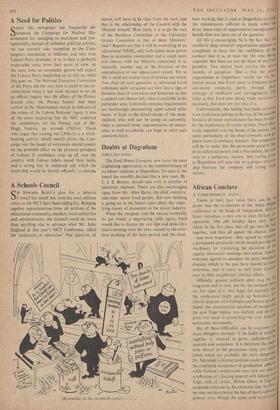A Schools Council
SIR EDWARD BOYLE'S plan for a Schools Council has much that even his most militant critics in the NUT have been calling for. Bringing together representatives from all sections of the educational community, teachers, local authorities and administrators, the Council could do more than anything else to advance what Mr. John England at this year's NUT Conference called the 'profession of education.' One question, of
'Meanwhile, in the twentieth century . . course, will have to be clear from the start, and that is the relationship of the Council with the Minister himself. How likely is it to go the way of the Burnham Committee or the University Grants Committee in two or three Ministers' time? Reports are that it will be something of an educational NEDC,., only with rather more power than its economic counterpart and a much more rearcontact with the Ministry concerned. It is, naturally, another step in the direction of the centralisation of our educational system. Yet in this it need not cramp local diversities too much. Too often on such questions as Advanced Level syllabuses such variations are now less a sign of freedom than of restriction and limitation in that a student can choose only what is available in his particular area. University entrance requirements are increasingly encroaching upon school sylla- buses, at least to the disadvantage of the many children who will not be going to university. Only a national body, representative of univer- sities as well as schools, can hope to solve such questions fairly.


































 Previous page
Previous page